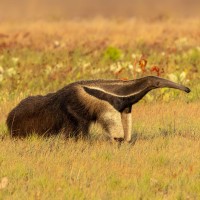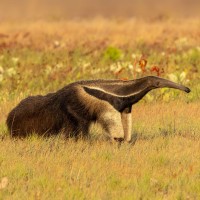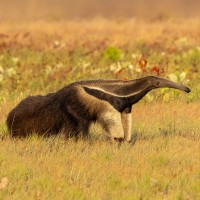Naturalist Journeys is thrilled to offer Guyana nature tours. Truly the gem of South America, Guyana’s original tropical forest, incredible wildlife, and unique approach to eco-tourism make it a destination that can’t be missed. From monkeys to motmots, wild cats to river otters, and butterflies to hummingbirds, Guyana teems with life and beckons to be explored.
Our Guyana wildlife tours are growing in popularity ... the secret's out! If one of our Guyana tours or any of our other South American birding tours interests you, let us know!
Guided Group Tours
Group travel is rewarding and fun! With more eyes you see more species. Travel Planners of Naturalist Journeys have been creating memorable journeys for 40+ years. We offer you small-group birding and nature tours, limited to just 8-13 persons led by expert guides. Learn and explore with like-minded people, enjoy local food and culture, and immerse yourself in birding and nature.
-
 Guyana: Unspoiled WildernessMarch 27 - April 8, 2025
Guyana: Unspoiled WildernessMarch 27 - April 8, 2025 -
 Guyana: Unspoiled WildernessNovember 6 - 18, 2025
Guyana: Unspoiled WildernessNovember 6 - 18, 2025 -
 Guyana: Unspoiled WildernessJanuary 15 - 27, 2026
Guyana: Unspoiled WildernessJanuary 15 - 27, 2026 -
 Guyana: Unspoiled WildernessFebruary 12 - 24, 2026
Guyana: Unspoiled WildernessFebruary 12 - 24, 2026 -
 Guyana: Unspoiled WildernessMarch 12 - 24, 2026
Guyana: Unspoiled WildernessMarch 12 - 24, 2026
Conservation Corner
We value conservation – it is at the heart of our work. All Naturalist Journeys’ tours support local conservation projects. Browse the links below to learn more about positive local work to save and conserve the wildlife and landscapes we visit.
Mercury Abatement
Mercury contamination resulting from small-scale gold mining continues to be a critical environmental threat in Guyana. World Wildlife Fund (WWF) Guianas works to abate the impact of gold mining, along with promoting sustainable fisheries, marine turtle conservation, protected areas planning, and land acquisition.
Makushi People
Amerindian communities of Makushi people are found throughout North Rupununi, where their ancestors lived for at least 7,000 years.
Forest Conservation
Increasing threats from forest logging are being fiercely opposed by coalitions of indigenous peoples and non-profit organizations like the Rainforest Foundation US.

